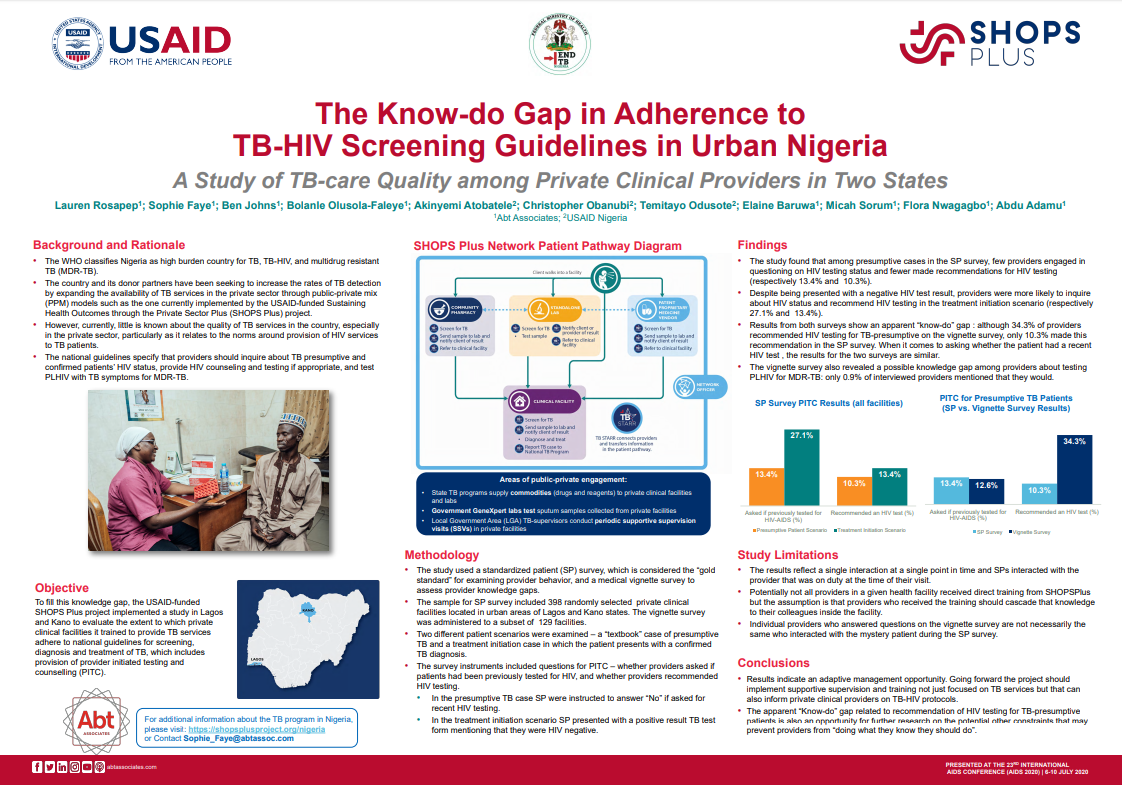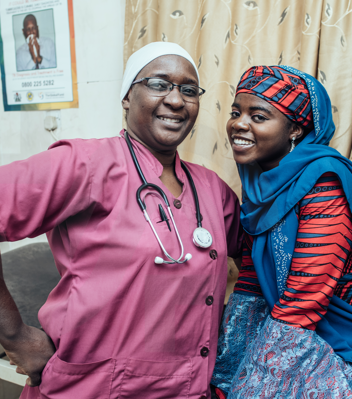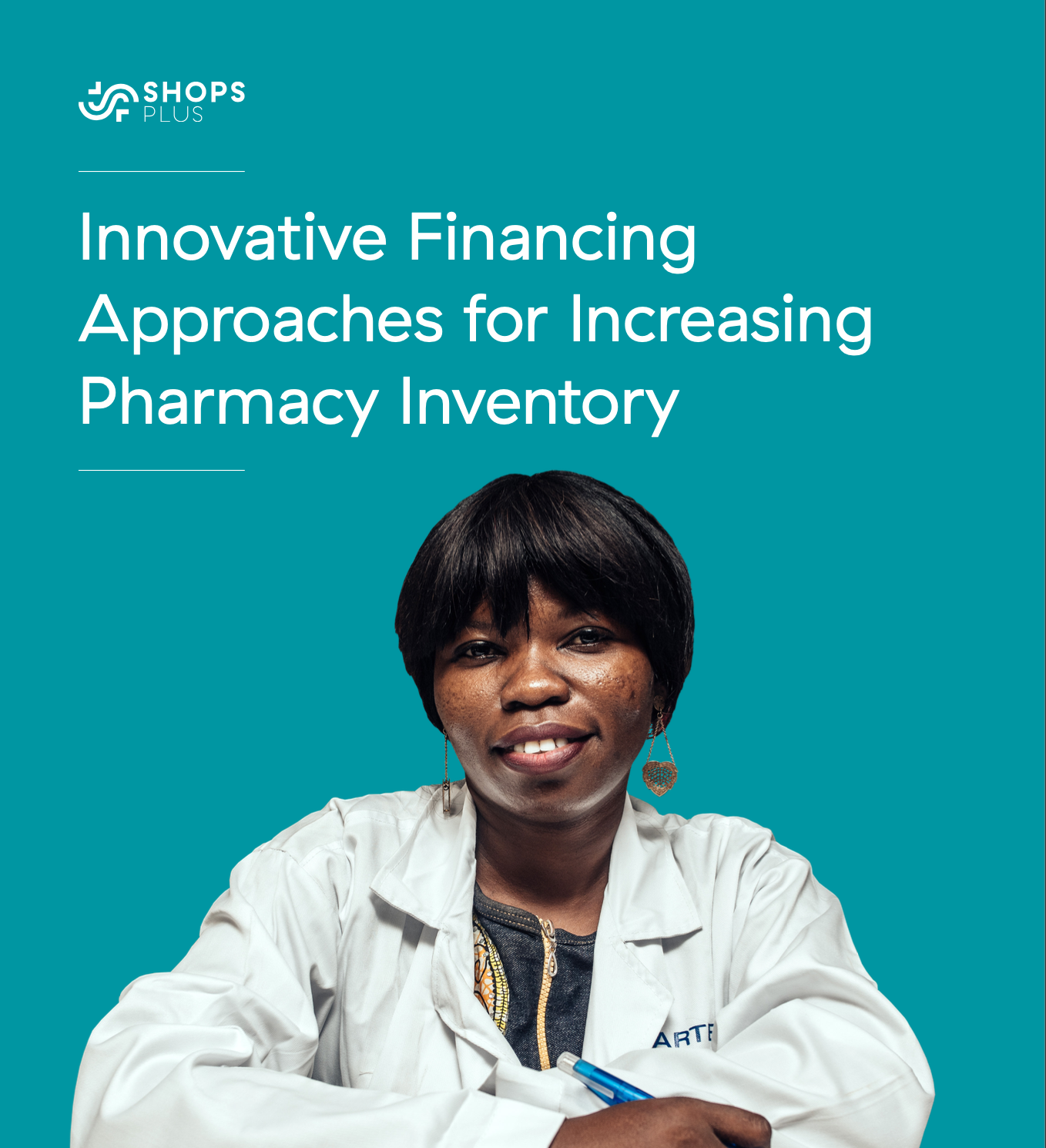
Resource Library
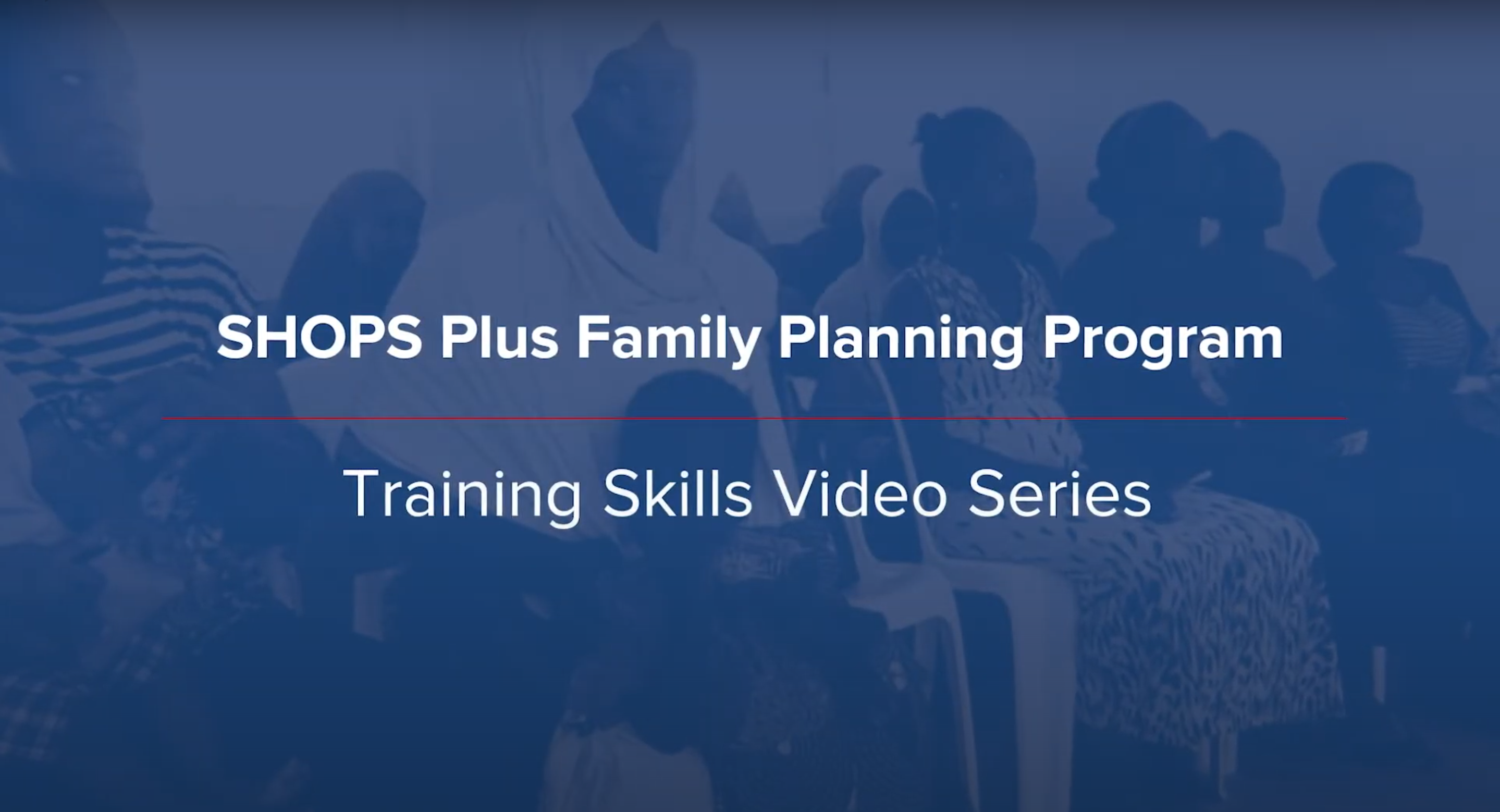
Nigeria family planning training skills video series
As SHOPS Plus worked to transition its approach to local institutions at the end of the program, the team met to discuss which topics still needed reinforcement with state trainers after their training. In discussions with master trainers, the team identified the three most challenging training skills that required additional support: constructive feedback, handling performance problems, and developing an action plan for improved performance. To address these topics, SHOPS Plus created training videos to ensure the sustainability of its training approach and support trainers building provider capacity to deliver quality services. The video series can be viewed below or you can view the videos on YouTube.
Click on the links below to download Training of Trainers and Provider Training manuals.
- SHOPS Plus Family Planning Clinical Provider Training Manual
- SHOPS Plus Training of Trainers for Family Planning Services Manual
Resource Type : Video
Country : Nigeria
Year : 2020-10-29T11:00:00
Language : English
Project : SHOPS Plus

Resource Library
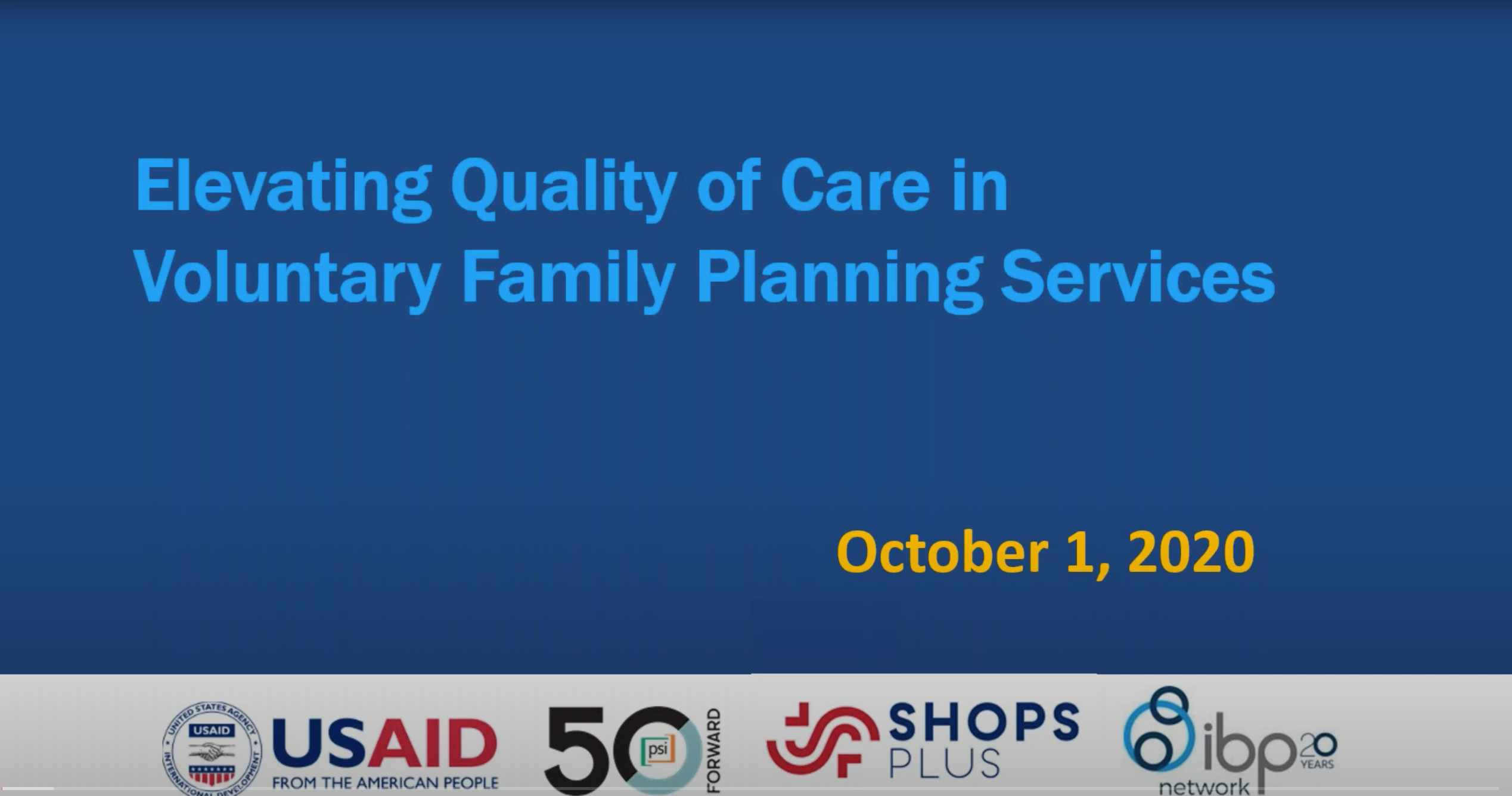
Video: Elevating Quality of Care in Voluntary Family Planning Services
The IBP Network hosted a webinar on October 1, 2020, that brought together representatives from the USAID-funded SIFPO2 and SHOPS Plus projects to discuss how quality of care is examined, understood, and measured from system, provider, and client perspectives. The presenters offered practical experiences from Nigeria, Senegal, Tanzania, and Uganda, and discussed how the global discourse on quality of care continues to evolve.
Resource Type : Webinar
Country :
Year : 2020-10-21T09:30:00
Language : English
Project : SHOPS Plus

Resource Library
Improving the quality of family planning services in Nigeria
SHOPS Plus worked in Akwa Ibom, FCT, Oyo, and Plateau to improve the capacity of providers to deliver quality family planning services. In the process, SHOPS Plus built “quality cultures” in health facilities which improved the provider-client relationship and ultimately the overall client experience. To build quality culture, the project employed four strategies: 1) improvement of knowledge and clinical capacity, 2) continuously strengthening practice, 3) strengthening of the enabling environment, 4) and building data management capacity.
Resource Type :
Country : Nigeria
Year : 2020-09-25T14:30:00
Language : English
Project : SHOPS Plus

Resource Library
The know-do gap in adherence to TB-HIV screening guidelines in Urban Nigeria
The WHO classifies Nigeria as high-burden country for TB, multidrug resistant TB (MDR-TB), and TB-HIV. Little is known about the quality of screening, diagnosis and treatment of TB in the country, especially in the private sector. SHOPS Plus implemented a study to evaluate the extent to which private clinical facilities it trained to provide TB services adhere to national standards for management of presumptive and confirmed TB. These standards specify that providers should inquire about a presumptive and confirmed patients’ HIV status, provide HIV counseling and testing if appropriate, and test people living with HIV with TB symptoms for MDR-TB. The study used a standardized patient survey, which is considered the “gold standard” for examining provider behavior, and a medical vignette survey to assess provider knowledge gaps. The sample included 398 clinical facilities in urban areas of Lagos and Kano states. Two different patient scenarios were examined—a “textbook” case of presumptive TB and a treatment initiation case in which the standardized patient presents with a confirmed TB diagnosis. The survey instrument included elements on provider-initiated HIV testing and counseling—whether providers asked if patients had been previously tested for HIV, and whether providers recommended HIV testing. The study found that among presumptive and treatment initiation cases, few providers engaged in questioning on HIV testing status (respectively 13.4% and 27.1%) or made recommendations for HIV testing (respectively 10.3% and 13.4%). The vignette survey revealed a knowledge gap among providers about testing PLHIV for MDR-TB (only 0.9% said they would). By comparing results from both surveys, a “know-do” gap is evident: Although 34.3% recommended HIV testing for TB-presumptives on the vignette survey, only 10.3% made this recommendation in the SP survey. Results indicate an adaptive management opportunity for SHOPS Plus. Going forward, the project should implement supportive supervision or training remediation to better sensitize private clinical providers to TB-HIV protocols. A planned follow-up survey before the end of the project will assess effectiveness of such support to improve the quality of TB care provided by SHOPS Plus-affiliated providers. This poster was shared virtually at the 23rd International AIDS Conference.
Resource Type : Infographic
Country : Nigeria
Year : 2020-07-20T12:34:00
Language : English
Project : SHOPS Plus

Resource Library
Using “Mystery Clients” to Examine TB Care Quality in Lagos and Kano – Key Findings
The World Health Organization classifies Nigeria as a high burden country for TB. The private health sector can play a potentially large role in increasing the case detection of TB. SHOPS Plus has been working with Nigeria’s National TB and Leprosy Control Programme (NTBLCP) since 2018 to implement a multi-cadre public-private mix model in Lagos and Kano to expand the availability of TB services and increase TB detection, notification, and treatment. The project conducted a study to evaluate the extent that private PPMVs, community pharmacies, laboratories, and clinical facilities it trained to provide TB services were adhering to national guidelines and standards for management of presumptive and confirmed TB. Despite bottlenecks related to the collection of sputum samples for diagnosis of TB and counseling for newly confirmed patients, SHOPS Plus private provider cadres managed mystery clients as well as or better than public TB directly observed treatment facilities.
Resource Type : Presentation
Country : Nigeria
Year : 2020-08-17T13:50:00
Language : English
Project : SHOPS Plus

Resource Library
Sources for Sick Child Care in Nigeria (Presentation)
The private sector is the dominant source of care in Nigeria. Understanding if and where sick children are taken for care is critical to improve case management interventions. This brief presents a secondary analysis of the 2018 Nigeria Demographic and Health Survey to examine where treatment or advice is sought for sick children who experienced at least one of three treatable illnesses: fever, acute respiratory infection, or diarrhea. These illnesses represent some of the leading causes of death in children under five years old.
Resource Type : Presentation
Country : Nigeria
Year : 2020-06-30T16:31:00
Language : English
Project : SHOPS Plus

Resource Library
Innovative Financing Approaches for Increasing Pharmacy Inventory
Private pharmacies and drug shops are important providers of family planning products in many low- to middle-income countries. This brief explores ways to expand access to finance for both. It explains the role of private pharmacies and drug shops within the family planning and health commodity supply chain; identifies how lack of access to financing constrains their ability to contribute to health outcomes; and provides an overview of their financing needs. It then presents a case study on programming in Nigeria designed to address these needs and concludes with recommendations for future programming to expand their access to financing. This brief consolidates learning from two projects—USAID-funded Sustaining Health Outcomes through the Private Sector (SHOPS) Plus and a predecessor, Strengthening Health Outcomes through the Private Sector Nigeria project (SHOPS Nigeria)—about approaches that have yielded positive results to increase financing along the supply chain for family planning commodities.
Resource Type : Brief
Country : Nigeria, Tanzania
Year : 2020-06-24T15:48:00
Language : English
Project : SHOPS Plus

Resource Library
Inspiring family planning providers to improve their facilities to deliver quality services
SHOPS Plus in Nigeria trained 931 providers to deliver family planning methods in the Federal Capital Territory, Plateau, Oyo, and Akwa Ibom states. In addition to a lack of training, providers face challenging infrastructural environments in the facilities where they work. The training that providers receive from SHOPS Plus, in addition to the relationships they build with supervisors and coaches, have inspired providers to improve their facilities so they can deliver high quality services. They have used their own money to create dedicated private spaces for FP in facilities and purchase equipment and supplies. Some providers have also collaborated with communities to build toilets and wells. These enhancements to FP service delivery have improved the experiences of the 175,000 FP users receiving services in the 888 SHOPS Plus supported facilities.
Resource Type : Brief
Country : Nigeria
Year : 2020-03-30T12:00:00
Language : English
Project : SHOPS Plus

Resource Library
SHOPS Plus Nigeria FP Program State Profile for Plateau
The SHOPS Plus program in Nigeria worked with the Plateau state government to increase women’s access to voluntary and rights-based family planning services by increasing the capability of public and private health providers to deliver quality family planning services, including long-acting reversible contraceptives, and improving the quality of family planning service delivery. In Plateau, the program trained a total of 388 providers, including doctors, nurse/midwives, and community health extensions workers. These providers delivered family planning services in 373 facilities, reaching over 77,000 women in all 17 local government areas of Plateau.
Resource Type : Brief
Country : Nigeria
Year : 2020-03-20T10:50:00
Language : English
Project : SHOPS Plus

Resource Library
SHOPS Plus Nigeria FP Program State Profile for Oyo
The SHOPS Plus program in Nigeria worked with the Oyo state government to increase women’s access to voluntary and rights-based FP services by increasing the capability of public and private health providers to deliver quality FP services, including long-acting reversible contraceptives, and improving the quality of FP service delivery. In Oyo, the program trained a total of 76 providers, including doctors, nurse/midwives, and community health extensions workers. These providers delivered FP services in 76 facilities, reaching over 6,000 women in six local government areas of Oyo.
Resource Type : Brief
Country : Nigeria
Year : 2020-03-20T10:40:00
Language : English
Project : SHOPS Plus
Pagination
- Previous page
- Page 4
- Next page


